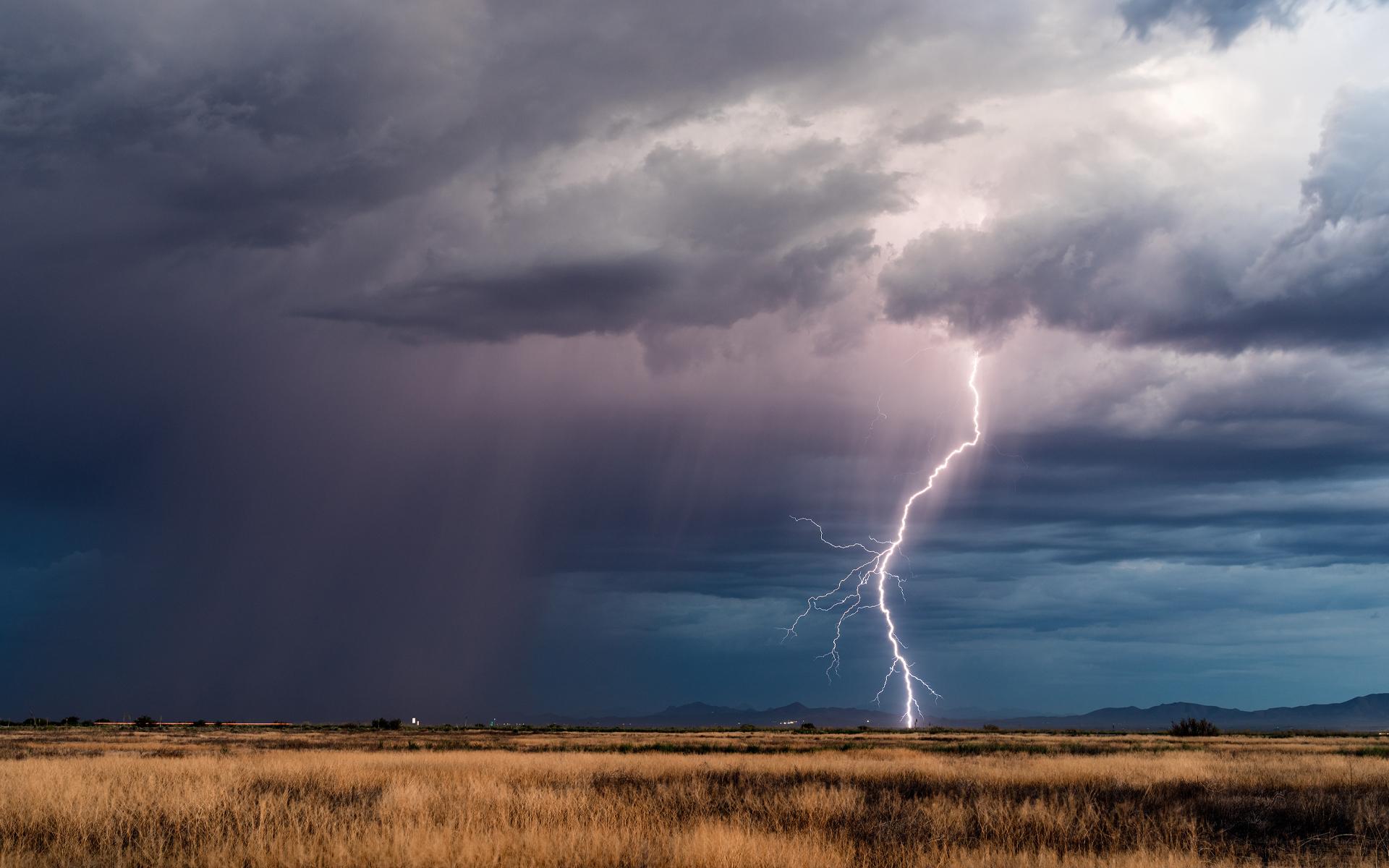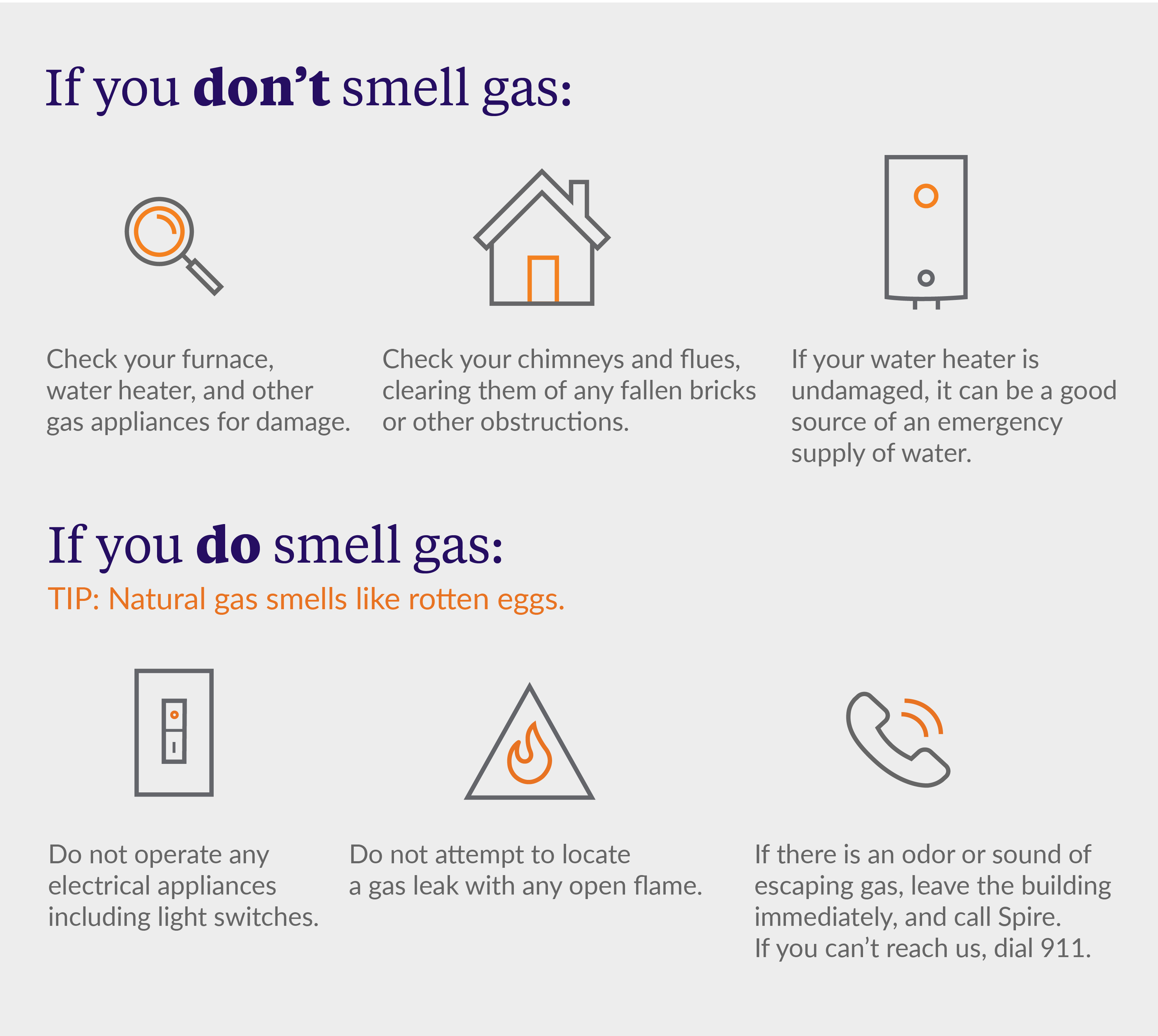default

When severe weather or a natural disaster occurs, nothing is more important than the safety of you and your family. Being prepared means you’ll know what to do to protect yourself and your home.
Be prepared.
- Have an emergency plan in place for winter storms and natural disasters earthquakes, tornadoes and hurricanes. Practice your plan with your family.
- Operate generators outside, and only use proper home heating equipment like your furnace to heat your home. Never use appliances like your oven as a substitute for home heat.
- Space heaters can be a great way to warm a small space, but be sure to place them carefully away from anything that can catch fire.
- Locate your gas shutoff valve and learn how to turn off your gas. Gas shutoff includes your main line and individual appliances.
- Store any flammable liquids, such as gasoline, paint and cleaning products away from any natural gas appliance with a pilot light
- Connect appliances, including ranges, dryers, and space heaters to the gas supply with flexible connectors (if local codes allow). Contact us if you need guidance on how to do this. We’re happy to help.
- Label gas valves, water valves, and electricity main switches. Teach responsible family members how and when to turn them off.
After severe weather or a natural disaster, take these steps:

Before and during an earthquake
- Store any flammable liquids, like gasoline, paint and cleaning products away from any natural gas appliance with a pilot light.
- Connect appliances, including ranges and dryers to the gas supply with flexible connectors (if local codes allow).
- Label gas valves, water valves and electricity main switches. Teach responsible family members how and when to turn them off, and do not turn off your gas unless there’s an emergency.
- If you’re cooking when an earthquake strikes, turn off the stove before you take cover.
After an earthquake
If you don't smell gas
- Check your furnace, water heater, and other gas appliances for damage.
- Before using your furnace or water heater, check your chimneys and flues, clearing them of any fallen bricks or other obstructions.
- If your water heater is undamaged, it can be a good source of an emergency supply of water.
If you DO smell gas
Natural gas smells like rotten eggs. If you smell natural gas – leave the area immediately and call us. We’ll be there as soon as we can.
- Do not operate any electrical appliances including light switches.
- Do not attempt to locate a gas leak with a match, candle, cigarette lighter, or any open flame.
- If there is an odor or sound of escaping gas, leave the building immediately, and call Spire from an outside phone. If you can’t reach us, contact your local fire department by dialing 911.
After a tornado
If you don't smell gas
- Check your furnace, water heater, and other gas appliances for damage.
- Before using your furnace or water heater, check your chimneys and flues, clearing them of any fallen bricks or other obstructions.
- If your water heater is undamaged, it can be a good source of an emergency supply of water.
If you DO smell gas
Natural gas smells like rotten eggs. If you smell natural gas – leave the area immediately and call us. We’ll be there as soon as we can.
- Do not operate any electrical appliances including light switches.
- Do not attempt to locate a gas leak with a match, candle, cigarette lighter, or any open flame.
- If there is an odor or sound of escaping gas, leave the building immediately, and call Spire from an outside phone. If you can’t reach us, contact your local fire department by dialing 911.
Remember, in most cases, even during a hurricane, your natural gas service should be fine because our pipes are underground. Occasionally, however, uprooted trees can damage buried pipelines. If that happens, we want you to be extremely cautious and stay safe. Please follow the instructions below.
If you don't smell gas
- Check your furnace, water heater and other gas appliances for damage.
- Before using your furnace or water heater, check chimneys and flues, clearing them of any fallen bricks or obstructions.
- If your water heater is undamaged, it can be a good source of an emergency supply of water.
If you DO smell gas
Natural gas smells like rotten eggs. If you smell natural gas – leave the area immediately and call us. We’ll be there as soon as we can.
Before the storm
If you live in a mobile or portable home, we recommend that you turn off your gas at the meter before the storm arrives.
If you live in a traditional home, there’s no need to turn off your gas. Doing so could result in unnecessary delays in having your service restored once the storm has passed. After the storm, you can schedule your reconnection when you’re ready to have your gas service restored. If you turn off your gas meter, do not try to restore service on your own.
We may recommend additional safety precautions if low-lying areas are threatened with a severe storm surge or excessive storm damage. Stay tuned to your local TV or radio stations for the latest information.
After the storm
If you don't smell gas
- Check your furnace, water heater and other gas appliances for damage.
- Before using your furnace or water heater, check chimneys and flues, clearing them of any fallen bricks or obstructions.
- If your water heater is undamaged, it can be a good source of an emergency supply of water.
If you DO smell gas
Natural gas smells like rotten eggs. If you smell natural gas – leave the area immediately and call us. We’ll be there as soon as we can.
- Do not operate any electrical appliances including light switches.
- Do not attempt to locate a gas leak with a match, candle, cigarette lighter or any open flame.
- If there’s an odor or sound of escaping gas, leave the building immediately, and call Spire from an outside phone. If you can’t reach us, contact your local fire department by dialing 911.
- As soon as it’s safe, Spire technicians will be on the streets examining the gas system for leaks and damages to make sure the area is secure.
- Standing water can extinguish your pilot light. If you smell gas or need us to relight your pilot light, give us a call.
- Once all unsafe conditions have been addressed, we will begin restoring gas service to any customers who have experienced service interruptions.
- We know you’ll be eager to have your service back, but we hope you’ll be patient with us. Depending on the number of customers affected, it could be several days before your service is restored. We promise we’ll do it as quickly as we can while ensuring everyone’s safety.